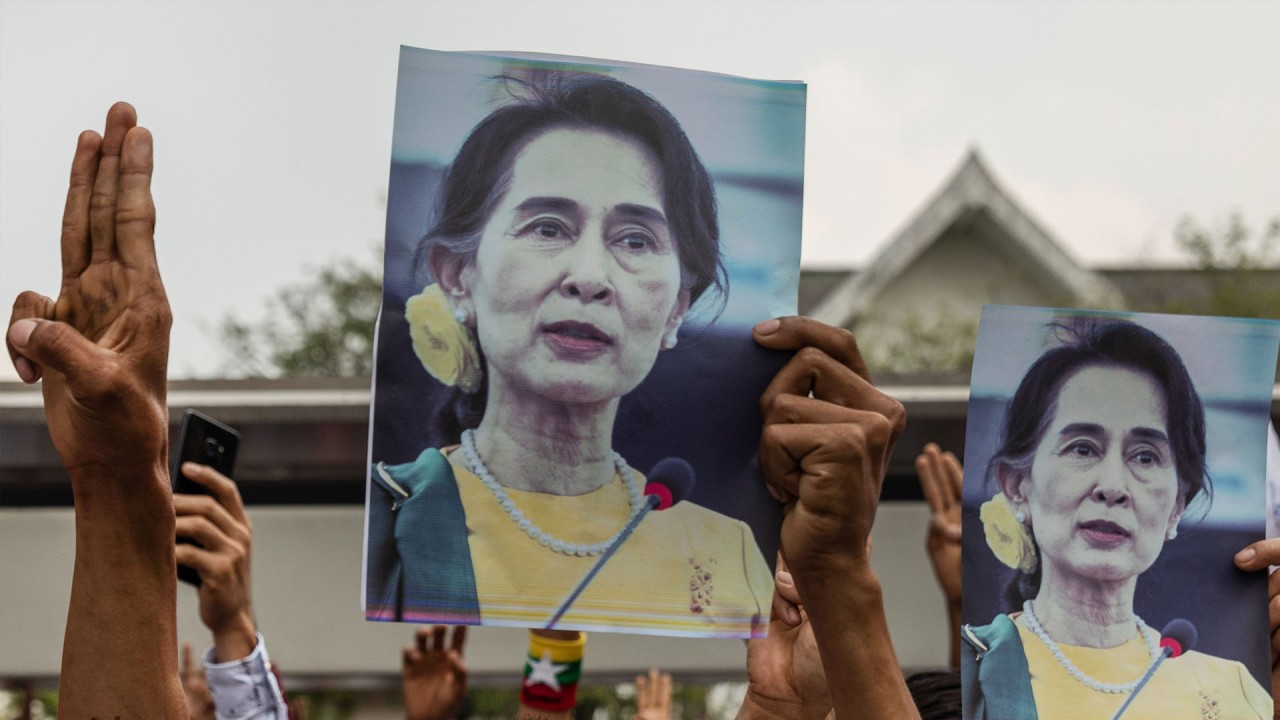
Myanmar’s Aung San Suu Kyi convicted again, Australia’s Sean Turnell gets 3 years for violating official secrets act
- Nobel laureate Suu Kyi has already been sentenced to 20 years in prison in separate cases, mostly related to corruption charges – she denies all charges
- Australian Sean Turnell has been in detention since a few days after a military coup in February 2021
Suu Kyi received a three-year sentence after being tried and convicted with Turnell under the secrets law, said the official, who spoke on condition of anonymity because he is not authorised to release information about the case.
Three members of her Cabinet were also found guilty, each receiving sentences of three years.
Turnell, an associate professor in economics at Sydney’s Macquarie University, had served as an adviser to Suu Kyi, who was detained in the capital Naypyidaw when her elected government was ousted by the army on February 1, 2021.
He has been in detention for almost 20 months. He was arrested five days after the military takeover by security forces at a hotel in Yangon, the country’s largest city, while waiting for a car to take him to the city’s international airport.
He was charged along with Suu Kyi and the three former Cabinet ministers on the basis of documents seized from him. The exact details of their offence have not been made public, though state television said last year that Turnell had access to “secret state financial information” and had tried to flee the country.

Turnell and Suu Kyi denied the allegations when they testified in their defence at the trial in August.
Turnell was also charged with violating immigration law, but it was not immediately clear what sentence he received for that.
Myanmar’s colonial-era official secrets act criminalises the possession, collection, recording, publishing, or sharing of state information that is “directly or indirectly, useful to an enemy.” The charge carries a maximum penalty of 14 years in prison.
All sessions of the trial, held in a purpose-built courtroom in Naypyidaw’s main prison, were closed to the media and the public. The defence lawyers were barred by a gag order from revealing details of the proceedings.
The same restrictions have applied to all of Suu Kyi’s trials.
The case that concluded on Thursday is one of several faced by Suu Kyi and is widely seen as an effort to discredit her to prevent her return to politics.
She had already been sentenced to 20 years’ imprisonment after being convicted of illegally importing and possessing walkie-talkies, violating coronavirus restrictions, sedition, election fraud and five corruption charges. The cases are widely seen as being concocted to keep the 77-year-old Suu Kyi from returning to active politics.
Suu Kyi is still being tried on seven counts under the country’s anti-corruption law, with each count punishable by up to 15 years in prison and a fine.
Defence lawyers are expected to file appeals in the secrets case in the coming days for Turnell, Suu Kyi and three former ministers: Soe Win and Kyaw Win, both former ministers for planning and finance, and Set Aung, a former deputy minister in the same ministry, the legal official said.
About half-a-dozen foreigners are known to have been arrested on political charges since the army takeover, and they generally have been deported after their convictions.
Myanmar detains UK’s former envoy Vicky Bowman and her husband
Australia has repeatedly demanded Turnell’s release. Last year, it suspended its defence cooperation with Myanmar and began redirecting humanitarian aid because of the military takeover and Turnell’s ongoing detention.
According to the Assistance Association for Political Prisoners, a rights monitoring organisation, 15,683 people have been detained on political charges in Myanmar since the army takeover, with 12,540 of those remaining in detention. At least 2,324 civilians have been killed by security forces in the same period, the group says, though the number is thought to be far higher.
Myanmar has been in turmoil since the takeover, which led to nationwide protests that the military government quashed with deadly force, triggering armed resistance that some UN experts now characterise as civil war.
Additional reporting by Reuters


